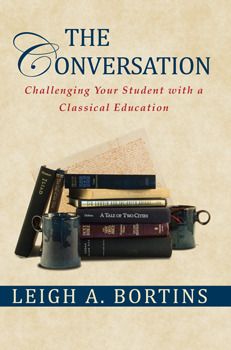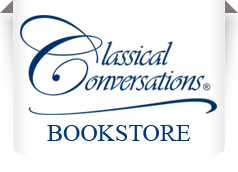I have often been intrigued by all that Classical Conversations has to offer, but for various reasons, I have never delved into their products...until now. I recently read The Conversation by Leigh A. Bortins. From the first moment I heard about this book, I knew that I wanted to read it. For one thing, the title immediately brought to mind Mortimer Adler and Robert Maynard Hutchins and their Great Books of the Western World set issued by Encyclopedia Britannica in the 1950s (of which I am a proud owner of a few of the volumes). I fell in love with Mortimer Adler through, of all things, 1950s game shows like "What's my Line?" Adler's book "How to Read a Book" is one of my all time favorites, but my favorite quote of his comes from an introduction to his Great Books series. He said, "What binds the authors together in an intellectual community is the great conversation in which they are engaged. In the works that come later in the sequence of years, we find authors listening to what their predecessors have to say about this idea or that, this topic or that."

This book has something for everyone. For someone like me, who received a classical Great Books undergraduate education from a Catholic university and has been counting the moments until she has children so that she can pass it along to them (after growing up in a house that was imbued with the Great Conversation, thanks to some incredible parents), this book is an affirmation of everything I know to be right. It affirms that habits are important and reminds me of the necessity to prioritize them in our educational journey. It makes me feel a solidarity with other classical educators. It's like chatting with an old friend. Seriously, Mrs. Bortins had me on p. xiii when she quoted Michael D. O'Brien's The Island of the World. This Catholic novel is my favorite book ever. Ever.
I think the book is particularly beneficial either for new homeschoolers or for homeschoolers new to teaching high school, though. There is something about reading it that makes you feel like saying, "Yes, I can!" Even more than that - "Yes, I want to!" Let's face it, the idea of homeschooling high schoolers can be intimidating. There is a ton of societal pressure to send the kids to a "real" high school. It's funny - I wouldn't have thought that I would feel it. After all, I have an advanced degree and I'm just...different...enough that people would kind of expect me to homeschool high school. It's *dance* of all things that has made people ask me if I am sending Therese to high school. "Don't you want her to be on drill team?!" Well, I'd much rather discuss The Nicomachean Ethics and The Summa Theologica with her. Gosh, teaching her high school is my reward for having to deal with beginning phonics and arithmetic. I was *not* meant to teach small children. There's a reason I went for a Ph.D. (well, there are many, but one is that I wanted to teach college kids). I prefer the age and I *love* the material. I feel that you spend all of that time forming your children and putting all of the pieces in place. Why, then, would you hand off all of your hard work to someone else - probably just to see it ruined?
When you read Leigh Bortins' book, you get constant affirmation from her that homeschooling your high schooler is the right move for both of you. Using the five canons of classical rhetoric (as organized by both Cicero and Aristotle, although Bortins uses Aristotle's characterization), Mrs. Bortins goes through all of the Rhetorical Arts and demonstrates how to implement a classical high school education. Each chapter ends with an extremely useful chart, so, for example, "Writing Using the Five Canons of Rhetoric." These summaries are very helpful if you have finished a chapter but are still unsure about the practical application of what you have just read.
The Conversation will mean something different to everyone who reads it, so be sure to click the banner below to read all of the reviews. For me, the book will have a permanent place in my homeschool library. I absolutely love it!



Hello,
ReplyDeleteWe are a not-for-profit educational organization founded by Mortimer Adler and we have recently made an exciting discovery—three years after writing the wonderfully expanded third edition of How to Read a Book, Mortimer Adler and Charles Van Doren made a series of thirteen 14-minute videos—lively discussing the art of reading. The videos were produced by Encyclopaedia Britannica. For reasons unknown, sometime after their original publication, these videos were lost.
Three hours with Mortimer Adler and Charles Van Doren, lively discussing the art of reading on one DVD. A must for all readers, libraries and classroom teaching the art of reading.
I cannot exaggerate how instructive these programs are—we are so sure that you will agree, if you are not completely satisfied, we will refund your donation.
Please go here to see a clip and learn more:
http://www.thegreatideas.org/HowToReadABook.htm
ISBN: 978-1-61535-311-8
Thank you,
Max Weismann, Co-founder with Dr. Adler